- Home
- Alice Hoffman
Second Nature Page 2
Second Nature Read online
Page 2
The uncle didn’t bother to answer, he was too busy tying the limp body onto the snowmobile with thick brown rope. Clouds were moving in fast, threatening more snow. They had to get to the rangers’ station, where a helicopter ran an airlift to St. Joseph’s Hospital in Cromley. The uncle’s breathing was ragged. He knew for a fact that the trap had shattered the left foot; bone jutted through the skin. As the uncle was positioning the head onto a blanket he realized how young their victim was, younger than his nephew. Once he looked at the pale face, with its high cheekbones and knots of dark hair, he couldn’t look away, even though he had removed his gloves to lash the rope to the snowmobile and his fingers were freezing. If he’d seen anything like this face before, it was in the chapel at St. Joseph’s, where he’d waited while his wife was being operated on for something wrong inside her stomach a few years back. To the right of the pews, in a dark alcove, there had been a statue made of white wood with a countenance so calm it had made him weep.
He pulled his gloves back on and started his snowmobile. In less than three hours, work would begin in the only operating room in St. Joseph’s as an orthopedic surgeon repaired the bones the steel trap had shattered. Two weeks later, the patient would be flown to Kelvin Medical Center on East Eighty-sixth Street in New York, a hospital that dealt exclusively with victims of traumatic stress. There he would stay, in a locked room, for the next few months, while some of the best doctors in the city tried to ascertain what they were dealing with. But the uncle knew what they had right then and there. It didn’t matter what people said on winter nights this year or the year after or the one after that. It didn’t matter what people believed. The uncle knew exactly what it was they were dealing with, on this night and forever after. They had caught themselves a wolf.
Robin Moore was stopped for speeding every time she drove through town. It made no difference whether she was going thirty-three miles an hour in a thirty-mile-an-hour zone, or if teenagers in Trans Ams were revving their engines and passing her by. She could tell when it was going to happen, she’d get a funny taste in her mouth, as if she’d eaten a lemon or a spoonful of salt, and then she’d hear the siren. Robin always pulled over to the side of the road calmly, then rolled down her window and waited. “Is there a problem, Officer?” she’d say in a voice so sweet you’d never guess at the depth of her bitterness or imagine that she knew every local policeman by name. She’d had coffee with their wives, and invited everyone over to the house for barbecues; she’d fixed onion dip and guacamole on nights when the men had sat in her kitchen playing poker.
The problem was that she was divorcing Roy, and either he thought it was amusing to have his buddies stop her for minor infractions—an inspection sticker overdue, a broken left tail-light, the alleged speeding—or he believed this harassment would make her realize she needed him. Either way, Robin’s glove compartment was now chock-full of tickets, none of which she’d paid. She had fallen for Roy when she was sixteen, the same age their son, Connor, was now: a dangerous and stupid year when boys jumped into fast cars without thinking twice and girls drank themselves silly down at the beach near Poorman’s Point and sometimes did enough damage to last a lifetime.
She couldn’t keep away from Roy back then. The more trouble he got into, the more her family despaired, the more she had to have him. His father, Neil, had worked for Robin’s grandfather and drawn up the sketches for the arboretum when the land was nothing more than cattails and scrub pine. In Nassau County, Roy’s father was known as the Doctor, since he could cure almost any tree, whether it was a dying elm or a willow hit by lightning. Roy had started coming around with the Doctor during the summer Robin turned sixteen, although it was clear he didn’t give a damn for willows and elms. He started throwing rocks at the patio whenever she was out reading in the hammock. He began to wait for her outside the kitchen door, near the rosemary and the Russian sage. He kissed her for the first time beneath the arbor where the wisteria bloomed. Not long after this kiss, and hundreds more like it, Robin’s grandfather made his declaration that under no circumstances could she marry Roy, which pretty much sealed her fate.
And now, although they had a legal separation, Roy was somehow convinced they were still together, even after their final fight, a nasty display of distrust on the corner of Delaney. That night Robin went home and dragged all of Roy’s clothes out to the driveway, and when he got home and saw his clothes flung across the concrete, he must have known where they were heading. Yet almost a year later he continued to appear at the house unexpectedly. He was there, he said, to check Connor’s homework—somethmg he’d never done when he lived with them—or to make certain the hot water heater wasn’t on the fritz. Once, he had arrived on a Saturday night and had done everything possible to try to get her into bed. He came up behind her and whispered, the way he used to: Just this one time, one little fuck, come on, baby. She thought he was kidding until he shoved his hand into her pants, and she had to push him away. The next day he’d come back, sheepish and polite, with a peace offering: a truckful of manure, which he said the Doctor had asked him to deliver, highly unlikely, since Robin had just seen her father-in-law that morning and he hadn’t mentioned a word about cow shit.
When Robin was starting out, the Doctor never viewed her as competition; surely there were enough gardens on the island for them both. He sent her customers and called nurseries out on the East End to get her a discount. He taught her to hang jars of beer from fruit trees so that wasps could drink themselves to death, and to circle herb gardens with a ring of salt, which slugs wouldn’t dare to cross.
It was true that Robin spent too long with each client, poring over books, plotting out designs for perennial beds in watercolor and ink, but that wasn’t the reason her business was ailing. Lately, everything she touched seemed to die. Robin attributed this to the anger she had carried around all winter, ever since her breakup with Roy. If she pruned a rose-bush in the morning, by midafternoon the canes would begin to wither; by evening they would turn black. Just last night, she’d discovered that every bulb in the pot of forced tulips on her dining room table had decayed only minutes after she’d torn off some of the yellowing leaves. All week there had been good weather for gardens, with a light rain turning the cold earth squishy and warm—perfect conditions to begin spring cleanup for her regular clients—but Robin didn’t bother to return any of their calls. Whatever bad luck she was having might seep through the old leather gloves she wore when she cut back brambles and raked mulch off the season’s first lilies-of-the-valley.
This stretch of sour fortune wasn’t the reason she was driv ing in to see her brother, although it now seemed as if just getting out of town would take all day. Already she had been pulled over twice, once near the King Kullen supermarket by that moron Woody Preston, who grinned as he wrote out a speeding ticket—four miles over the limit—and the second time only a mile from the bridge, where George Tenney at least had the decency to look embarrassed as he wrote out the ticket for failing to signal when she changed lanes. Robin had tossed the ticket into the overflowing glove compartment right in front of him.
“You’re going to have to start paying those,” George said of her growing collection.
“I don’t think so,” Robin said. She hadn’t bothered to dress up and was wearing her rain slicker, a pair of jeans, a khaki-colored sweater, old green boots. She had small callused hands and beneath each fingernail was a line of dirt that seemed never to wash away, not even if she sat in the bath for hours and used her good soap from Italy.
“You could give Roy another chance,” George suggested. He was a large, soft man who loved poker and almost went nuts when his own wife left him. For months afterward, Roy brought him home for dinner on Tuesday nights, and George ate steadily and slowly, asking for the peas or the rolls in a wounded voice.
“Are you a marriage counselor?” Robin asked him.
“Well, no,” George said. “I can’t say that I am.”
“Okay, George, just tell me this. Was Roy fucking around the whole time we were married, or just at the end?”
“Robin,” George said in that wounded voice. “That’s not nice.”
“No, it’s not,” Robin agreed. A fine rain had begun, and Robin turned on the windshield wipers, then gunned the engine of the pickup so it wouldn’t die on her as it often did in damp weather. “Do you want to come over for dinner on Friday? Vegetarian lasagna, but you won’t be able to tell there’s no meat.”
“You know I can’t,” George said. He’d known Robin forever and he hadn’t had a home-cooked meal for months, but it wasn’t a good idea to socialize with a beautiful woman who happened to be Roy’s not-quite ex-wife.
“It’s not like I’m asking you for a date, George,” Robin said. “But hey, I guess it’s good to find out who your real friends are.”
She said this just to ride him, since she knew that anyone connected with the police department had to side with Roy. People simply couldn’t stand it when your marriage broke up; they took it personally. Even Robin’s oldest friend, Michelle Altero, who had never liked Roy, and had cried at their wedding, real sobs, not just polite tears, had suggested she give him another chance.
“Can I go now?” Robin asked George.
“Sure,” George said. He wasn’t too happy about standing on the side of the service road in the rain, getting involved in someone’s private affairs. “Where is it you’re going, anyway?” he asked. He truly believed he was being casual.
“Who wants to know?” Robin said.
She could be real fresh when she wanted to be, which George figured came from growing up with the notion she’d be rich someday. As it was, he knew for a fact she’d been hours away from having her electricity cut off the month before. Roy had thought that might bring her back to him, but it hadn’t worked out that way. The electric company had given her a five-day extension, and before Roy could persuade them otherwise, Robin had paid off her bill.
“Come on, Robin,” George said.
“Tell Roy where I go is none of his business.”
“How do you think Old Dick would have liked what’s happened between you and Roy?” George asked. “Did you ever consider that?”
Robin hated to hear her grandfather referred to as Old Dick, but she kept her mouth shut. This is what happened when you grew up on an island, people assumed they had a perfect right to pull you over on a service road and give you marital advice. Maybe Robin’s brother had been right; when he and Kay broke up, Stuart moved into Manhattan. He couldn’t pass a single street corner in town without being reminded of a dozen things he’d done or said. It was like living with ghosts: he couldn’t have a cup of coffee at Fred’s Diner in peace without having some phantom settle down on the stool beside him.
“My grandfather always despised Roy,” Robin announced. In fact, there wasn’t a man in town her grandfather hadn’t loathed. “He refused to come to our wedding.”
“Old Dick would never have favored a divorce,” George insisted, but he let her go and watched mournfully as she pulled her truck onto the service road, then headed toward the bridge where the willow trees grew. Once she crossed over, no one on the local police force could stop her; she’d be out of their jurisdiction, driving as fast as she pleased.
Beside the wooden bridge, the thick twisted roots of the old willows coiled through the muddy earth. Anyone who approached the island for the first time at dusk could easily believe that these willows had once been men; they seemed to cry out loud and their thin branches tapped against the hoods of passing cars. No one knew when the trees had been planted, but they were already old when Richard Aaron first came to the island in 1923. They’d frightened off everyone but the bravest fishermen and the cats that someone had once brought across to drown in a burlap bag but that had escaped to breed in the marshes, living wild on bluefish and sparrows.
There was no bridge back then, and Aaron had to put on black hip boots and wade through the water to the other side, stepping over hermit crabs and moon snails. He’d paid thirteen thousand dollars cash for the island—a good deal even then, one he’d managed because the previous owner believed that warm air rising from marshes caused malaria and scarlet fever. On the north side the first big Queen Annes were built, with stone fireplaces and fish-head shingles; on the south side were workers’ cottages for the stonemasons and carpenters, some of whom stayed on after their work was through. Off to the west, Aaron built his own house, with bricks carted over the bridge, and panels of stained glass that were tied to the masons’ backs with thick rope, then covered with white muslin to protect them from cracking. He kept five acres of black pine and beach grass and Rosa rugosa for himself, most of which was to become Poorman’s Point after his only son squandered everything on a real estate venture in Florida that went wrong because of hurricanes or bad economic times or simple carelessness.
Old Dick was not dead, as many people on the island assumed, although he was always talked about in the past tense. He was ninety-one years old and had outlived his son and his sisters and brothers and just about everybody else he considered to be worth two cents. The main house had been closed down for more than twenty years, and Old Dick lived above the garage with his housekeeper, Ginny, who was eighty-four. He couldn’t get out of his bed unless he was lifted, and he hadn’t seen sunlight for years, but when Robin went to visit him he was still able to muster the strength to scream at her. She went only once a month, on the last Sunday, making certain always to bring an apple pie. A good apple pie was the one thing Old Dick wouldn’t scream about, and Robin sneaked slices to him, on paper plates, since Ginny didn’t allow him any sugar or salt.
And that’s what Robin was going to see Stuart about. Trying to get Stuart on the phone was always so frustrating, and this was too important, she couldn’t wait. Ginny’s health was failing and her daughters wanted to send her to a nursing home in New Jersey, and then what the hell would they do with Old Dick? Stuart had been all but supporting him, since Social Security was barely enough to pay Ginny’s weekly salary, and there were food and heating bills and medicine to consider. The truth of it was, Stuart had been helping Robin out, too, since she didn’t want to ask Roy for any more than the pittance she was legally allowed. Thank goodness for Stuart, who was so practical, he liked to joke, that he applied to medical school when he realized he needed a twenty-four-hour-a-day psychiatrist and decided it was cheaper to become one than to engage one at the going rates. When he and Kay divorced, Stuart had insisted she buy a Volvo, after checking every import’s safety record; he heartily disapproved of Robin’s old pickup, which, as she now approached the Mid-town Tunnel, skidded as it always did when she was in a hurry and the asphalt was wet.
There were no meters free, so Robin had to park in one of the expensive lots, on Eighty-fifth, then run through the rain over to Kelvin Medical Center, but at least she was wearing her boots. By the time she reached the building, her hair had unwound from its elastic band and her rain slicker was dripping wet. The storm had now begun in earnest, the kind of downpour that flooded gutters and whipped umbrellas into the air. When Robin got out of the elevator on the fourteenth floor, her ears ached with the drop in air pressure. She was on her way to Stuart’s office, thinking about Medicare and lasagna and a new mildew-resistant variety of aster, when the Wolf Man was led into the hallway. Because he was handcuffed, the attendants assumed he was harmless; they left him in the corridor while they went to sign for his transfer. The air was so murky and still that the mice grew confused, and believing it was midnight, they dashed out of the heating vents. A few nurses and attendants who had the day off had come in just to get a glimpse of the Wolf Man, and they were disappointed when he kept his eyes downcast. Patients on crutches struggled to their doorways in their hospital gowns so that someday they could tell their grandchildren they’d been there, right in the same hospital, breathing the very same air, but most of them mistook the Wolf Man for a maintenance worker and looked right past him.
“Is that him?” Robin asked one of the nurses. “The Wolf Man?”
“We’re not supposed to call him that,” the nurse told her, but of course Stuart called him that all the time, at least in private.
Stuart had talked about this patient constantly when he’d first been flown in from Michigan. All the cases of children raised by animals had been dubious, records had been tampered with, fears reported as fact, medical histories obscured, so that one never knew whether ill children simply had been abandoned out in the woods, where no one was likely to find them, by families too poor or overwhelmed to cope. Not one of these children had ever gained enough language to tell his own story, and Stuart’s hope was that this patient would change all that. If they were lucky, he had been able to speak before he was lost, and with help he might remember all he once knew. But by the beginning of March, Stuart no longer discussed the Wolf Man with Robin, and by the end of the month the arguments he offered to his colleagues about keeping the patient at the medical center sounded weak, even to him. Through all the hours of therapy, the patient had not spoken one word.
“Well, he doesn’t look very fierce,” Robin said to the nurse.
“Oh, really?” the nurse said archly, as she started down the hall. “He’d bite your head off in a minute. He’d slit your throat and never think twice.”
The Wolf Man was hunched over on a wooden bench in his black overcoat, which was two sizes too big. His hair had been clipped so short Robin could see his scalp. There was a gash in the back of his neck, left when the barber’s hand had begun to tremble. Robin took off her yellow slicker and shook out the rain; she would have continued on to Stuart’s office at the end of the hall if she hadn’t seen a mouse scurry along the bench. Behind his back, the Wolf Man closed his fist over the mouse before it had the chance to dart away. Then he looked at Robin, suddenly, as if he knew he was being watched.

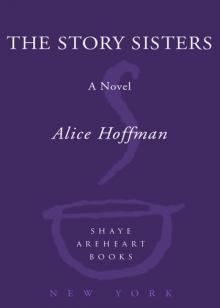 The Story Sisters
The Story Sisters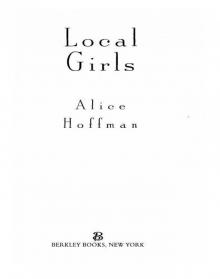 Local Girls
Local Girls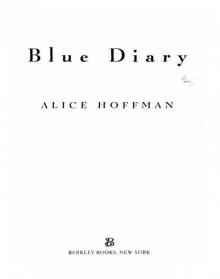 Blue Diary
Blue Diary The River King
The River King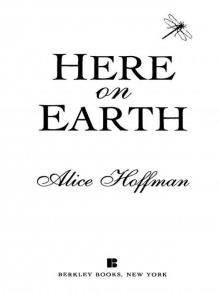 Here on Earth
Here on Earth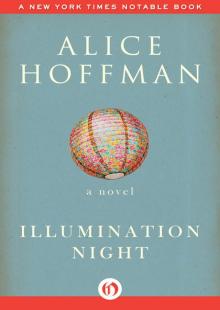 Illumination Night: A Novel
Illumination Night: A Novel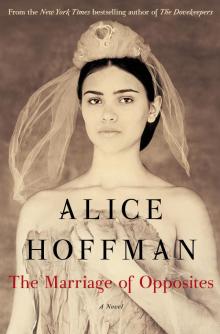 The Marriage of Opposites
The Marriage of Opposites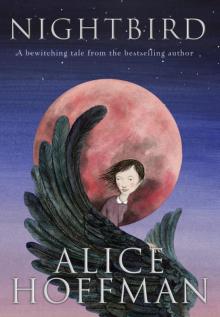 Nightbird
Nightbird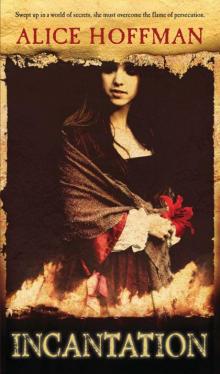 Incantation
Incantation Skylight Confessions
Skylight Confessions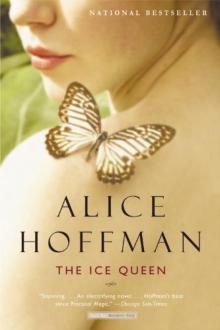 The Ice Queen
The Ice Queen Second Nature
Second Nature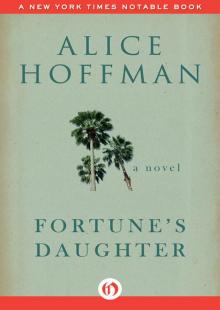 Fortune's Daughter: A Novel
Fortune's Daughter: A Novel Seventh Heaven
Seventh Heaven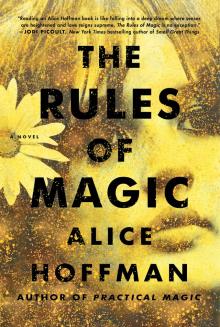 The Rules of Magic
The Rules of Magic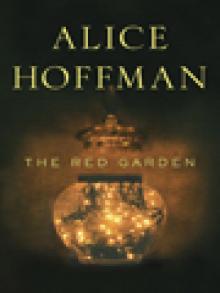 The Red Garden
The Red Garden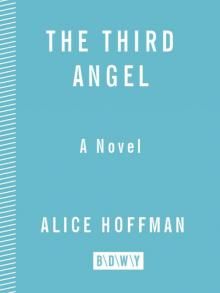 The Third Angel
The Third Angel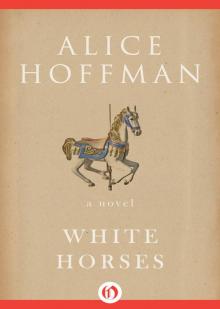 White Horses
White Horses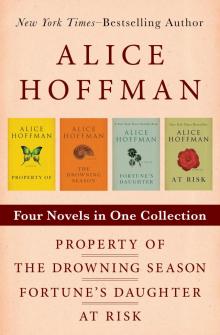 Property of / the Drowning Season / Fortune's Daughter / at Risk
Property of / the Drowning Season / Fortune's Daughter / at Risk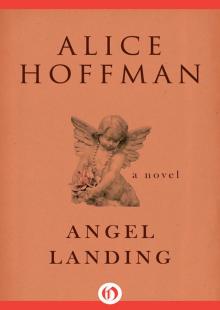 Angel Landing
Angel Landing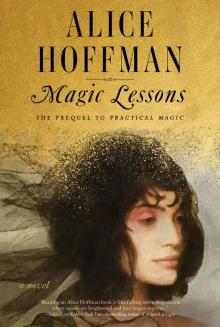 Magic Lessons
Magic Lessons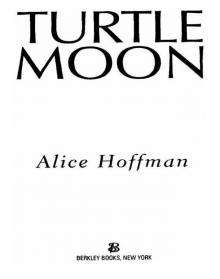 Turtle Moon
Turtle Moon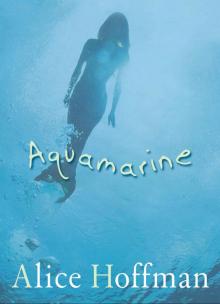 Aquamarine
Aquamarine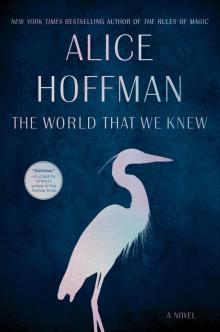 The World That We Knew
The World That We Knew Faithful
Faithful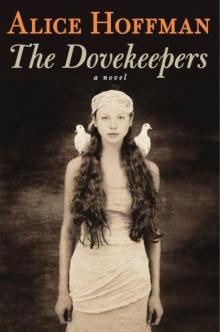 The Dovekeepers
The Dovekeepers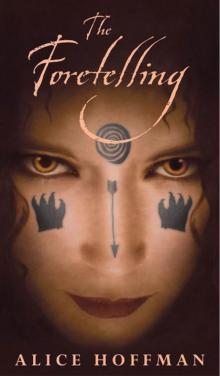 The Foretelling
The Foretelling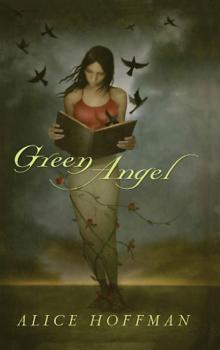 Green Angel
Green Angel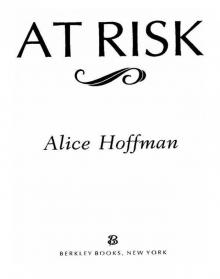 At Risk
At Risk Green Heart
Green Heart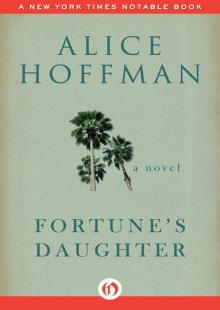 Fortune's Daughter
Fortune's Daughter Faerie Knitting
Faerie Knitting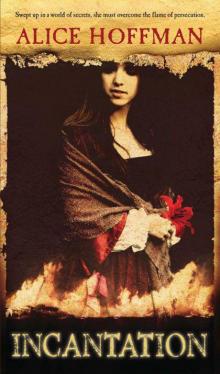 Incantation (v5)
Incantation (v5) Green Witch
Green Witch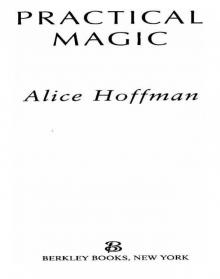 Practical Magic
Practical Magic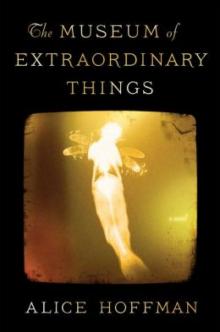 The Museum of Extraordinary Things
The Museum of Extraordinary Things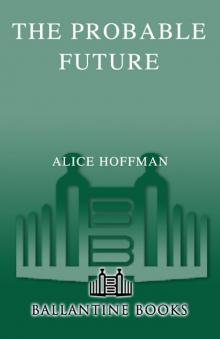 The Probable Future
The Probable Future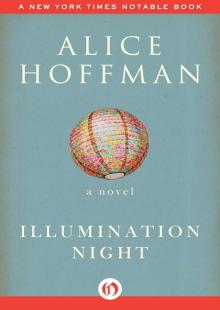 Illumination Night
Illumination Night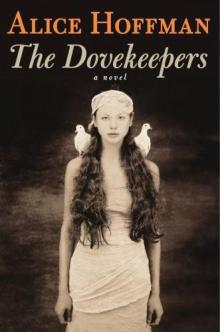 The Dovekeepers: A Novel
The Dovekeepers: A Novel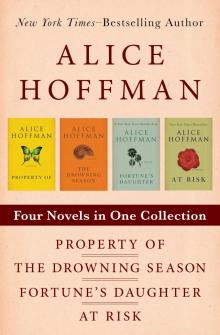 Property Of, the Drowning Season, Fortune's Daughter, and At Risk
Property Of, the Drowning Season, Fortune's Daughter, and At Risk